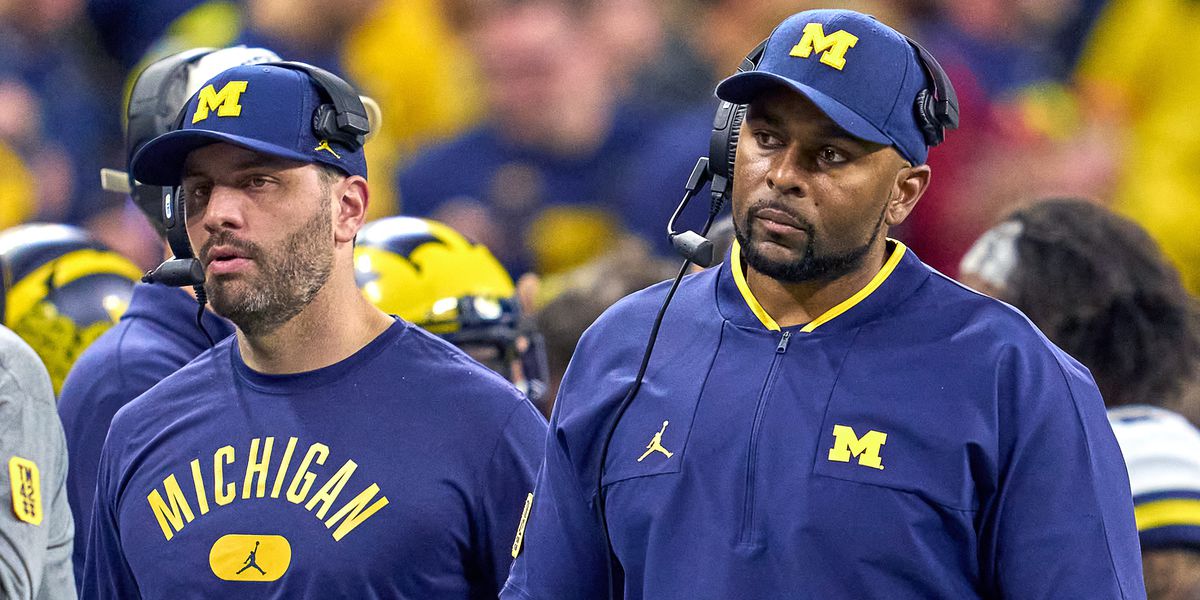HOUSTON — Michigan has been characterized by various adjectives, including gritty, physical, resilient, dominant, and balanced. Another descriptor that has been added to the mix is “controversial cheaters.”
Should Michigan secure a victory against Washington at NRG Stadium in Houston on Monday night, it would mark the school’s first national championship since 1997, concluding a period of over 25 years of frustration. This achievement would also symbolize a transformative three-year journey for Jim Harbaugh, who successfully altered his coaching narrative at his alma mater.
During Harbaugh’s initial six seasons in charge, Michigan struggled to make a significant impact, consistently falling short in crucial games. However, in recent times, there has been a notable shift, with three consecutive victories over Ohio State and a breakthrough in the College Football Playoff, overcoming disappointing one-and-done outings in the preceding two years.
Despite the potential return of the Wolverines to the pinnacle of college football, the shadow of a sign-stealing and in-game scouting scandal lingers over the team’s narrative. This controversy, which garnered attention across the sports world, might eventually lead to NCAA sanctions in the future.
Similar to the Florida champions of 2008, whose legacy is tainted by off-the-field problems epitomized by the late Aaron Hernandez, and the 2017 World Series-winning Houston Astros, criticized for their elaborate sign-stealing scandal involving banging a garbage can to signal pitches, these stains on a team’s reputation endure.
In this case, a lower-tier staff member named Connor Stalions allegedly orchestrated an intricate system of scouting and sign stealing. Stalions went to great lengths, purchasing tickets to games involving other Big Ten teams and potential playoff adversaries. He reportedly acquired tickets for over 35 games at 17 different stadiums across the country through third-party vendors, involving a network of at least three individuals who received tickets to attend these games. Videotape evidence allegedly captures him recording the sidelines of future Michigan opponents.
Despite these revelations, there remain numerous unanswered questions, and certain aspects may never be fully clarified. The extent of the advantage gained by Michigan, whether they had insight into the opponent’s plays, and the potential role of this scandal in the team’s recent dominance are still uncertain. Given the pace of NCAA proceedings, it’s suggested that by the time a ruling is reached, the landscape of the NCAA itself might have undergone significant changes or ceased to exist.
If there was no tangible advantage, it’s improbable that Michigan would have persisted in the alleged sign-stealing practices. However, despite the controversy and subsequent suspension of head coach Jim Harbaugh for the final three regular-season games by the Big Ten, along with Stalions’ resignation amid an NCAA investigation, the Wolverines continued their successful streak. Notably, they secured another victory over Ohio State and clinched a hard-fought overtime win against favored Alabama in the playoff.
Since the scandal came to light in mid-October, Michigan has triumphed in seven consecutive games, and their performance has not shown signs of diminishing. If anything, the adversity seems to have fueled a resilient “us-against-the-world” mindset, as noted by Harbaugh himself after the thrilling Rose Bowl victory, suggesting it may have even provided an unintended advantage.
Harbaugh dismisses the idea of potential NCAA sanctions affecting their wins, rejecting the notion of dwelling in “rumorville and speculation.” Moreover, quarterback J.J. McCarthy contends that sign-stealing is pervasive in college football, asserting that around 80 percent of teams engage in it. He adds that even rival Ohio State was allegedly stealing Michigan’s signs in 2020 or 2019, prompting the Wolverines to elevate their level of precaution. McCarthy later clarified that this statement was not an admission of guilt but an acknowledgment of the need to protect their signs more effectively.
